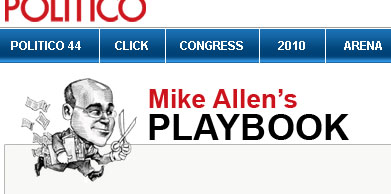 Here is Mark Leibovich of the New York Times on how Mike Allen’s “Playbook” has become the abridged Bible of modern time-crunched Washington:
Here is Mark Leibovich of the New York Times on how Mike Allen’s “Playbook” has become the abridged Bible of modern time-crunched Washington:
“The people in this community, they all want to read the same 10 stories,” [Allen] said, table-chopping in the Hay-Adams. “And to find all of those, you have to read 1,000 stories. And we do that for you.”
As a practical matter, here is how Allen’s 10 stories influence the influentials. Cable bookers, reporters and editors read Playbook obsessively, and it’s easy to pinpoint exactly how an item can spark copycat coverage that can drive a story. Items become segment pieces on “Morning Joe,” the MSNBC program, where there are 10 Politico Playbook segments each week, more than half of them featuring Allen. This incites other cable hits, many featuring Politico reporters, who collectively appear on television about 125 times a week. There are subsequent links to Politico stories on The Drudge Report, The Huffington Post and other Web aggregators that newspaper assigning editors and network news producers check regularly. “Washington narratives and impressions are no longer shaped by the grand pronouncements of big news organizations,” said Allen, a former reporter for three of them — The Washington Post, The New York Times and Time magazine. “The smartest people in politics give us the kindling, and we light the fire.”
For years I’ve avoided reading Playbook (and The Note and First Read) solely because everyone else does read them. That doesn’t mean it doesn’t influence me, of course, it just means that I’m unaware of the influence. I remain unsure whether I’m better off that way or not.
But groupthink is hard enough to avoid already. Deliberately immersing yourself in it just seems absurd. I guess if I were more of a political junkie I’d understand.

















